Feeding your Betta fish properly is crucial to their health and vitality. These vibrant little fish have specific dietary needs, and understanding how often to feed them pellets is key to ensuring they thrive.
Betta Fish Nutritional Needs
Basic Dietary Requirements
Betta fish, also known as Siamese fighting fish, are carnivores by nature. They require a diet rich in protein to maintain their energy levels and overall health. Betta fish pellets are designed to meet these dietary needs, providing essential nutrients that your fish can easily digest.
Key Nutrients in Betta Fish Pellets
Betta fish pellets are formulated to include proteins, fats, vitamins, and minerals. The protein content is particularly important for muscle development and growth. Look for pellets that list high-quality protein sources, such as fish meal or shrimp, at the top of the ingredient list.
Types of Betta Fish Pellets
High-Quality Pellets vs. Low-Quality Pellets
Not all fish pellets are created equal. High-quality pellets typically have a higher concentration of protein and fewer fillers. Lower-quality pellets might contain artificial colors or less digestible ingredients. Investing in high-quality pellets ensures that your Betta gets the best nutrition possible.
Specialized Formulations
Some pellets are designed to enhance the coloration of Betta fish. These specialized pellets contain additional pigments and nutrients that promote vivid colors. While these can be beneficial, they should be used in moderation and as a supplement to a balanced diet.
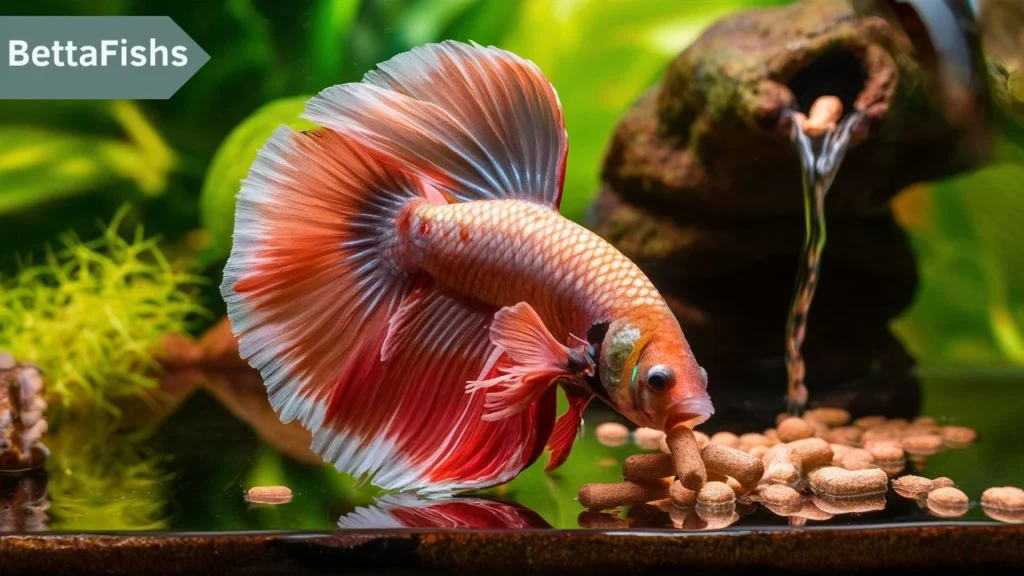
Feeding Frequency for Betta Fish
General Feeding Guidelines
Feed your betta fish two or three times a day. This frequency helps mimic their natural feeding habits and prevents overfeeding. Each feeding session should consist of a small amount of pellets that your Betta can consume within a few minutes.
Factors Influencing Feeding Frequency
The frequency of feeding your Betta fish can be affected by several things. These include the age of the fish, its activity level, and its overall health. Younger Betta fish may require more frequent feedings, while older fish might do well with slightly fewer meals.
How Many Pellets to Feed
Portion Sizes Based on Fish Size
The number of pellets you should feed your Betta fish depends on its size. As a general rule, offer 2-4 pellets per feeding. The pellets should be small enough for your Betta to eat in one bite. Overfeeding can lead to health issues, so it’s better to start with fewer pellets and adjust as needed.
Adjustments for Different Life Stages
Young Betta fish or fry require smaller portions and more frequent feedings. As they grow, you can gradually increase the pellet size and reduce the feeding frequency. Always monitor your fish’s condition and adjust the feeding amount accordingly.
Feeding Techniques
Methods for Efficient Feeding
To ensure your Betta fish gets the most out of its pellets, feed them in a clean, uneaten food-free tank environment. This prevents uneaten pellets from decomposing and affecting water quality. Use a feeding ring or drop the pellets in different spots to encourage your Betta to forage.
Avoiding Overfeeding and Underfeeding
Malnutrition can arise from underfeeding, whereas obesity and poor water quality can be caused by overfeeding. Keep an eye on your Betta’s body condition and adjust the pellet quantity based on its needs. Regularly monitor water conditions to prevent any adverse effects from uneaten food.
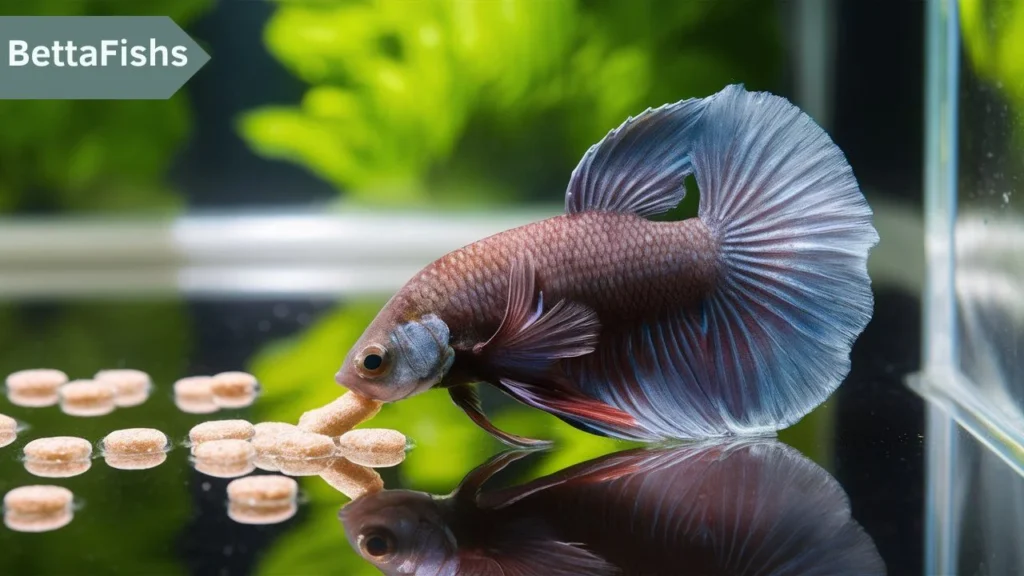
Signs of Overfeeding and Underfeeding
Recognizing Common Symptoms
Signs of overfeeding include bloating, sluggish behavior, and excessive waste. Underfed Betta fish might appear skinny, lethargic, or show signs of poor coloration. Address any feeding issues promptly to ensure your Betta remains in good health.
Adjusting Feeding Practices Accordingly
If you notice signs of overfeeding, reduce the number of pellets per feeding or increase the time between feedings. For underfed Betta fish, increase the pellet portion or feeding frequency. Regular observation will help you make the necessary adjustments.
Alternative Foods for Betta Fish
Live and Frozen Foods
Incorporating live or frozen foods, such as brine shrimp or bloodworms, can provide additional nutrients and variety to your Betta’s diet. These foods should complement, not replace, the main pellet diet.
Supplementing Pellets with Other Foods
Offering a variety of foods can help prevent dietary deficiencies and keep your Betta engaged. However, avoid overdoing it with treats, as they can disrupt the balance of the main diet.
Maintaining a Healthy Feeding Schedule
Establishing Consistent Feeding Times
Feeding your Betta fish consistently is essential. Establish regular feeding times to help your Betta maintain a healthy routine. This also allows you to monitor your fish’s health more effectively.
Tips for Monitoring Fish Health
Regularly check your Betta for any changes in behavior or appearance. A healthy Betta should be active, with a good appetite and vibrant colors. Any changes could indicate dietary or health issues that need addressing.
Common Mistakes in Betta Fish Feeding
Overfeeding Issues
Overfeeding is a typical problem made by owners of Betta fish. Both obesity and low water quality might result from it. Stick to recommended pellet quantities and avoid feeding more than necessary.
Using Inappropriate Pellet Types
Not all pellets are suitable for Betta fish. Avoid pellets intended for other types of fish or those with unsuitable ingredients. Choose pellets specifically formulated for Betta fish to ensure optimal nutrition.
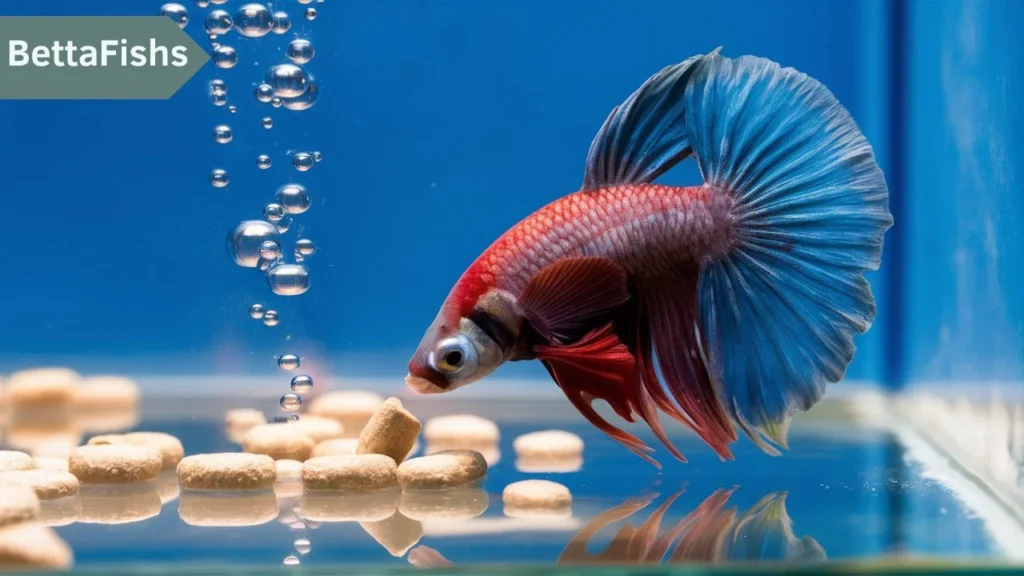
Special Considerations
Feeding Betta Fish in a Community Tank
If you have Betta fish in a community tank, ensure they are getting their share of food. Betta fish can be competitive eaters, so monitor feeding to make sure they are not being outcompeted by other fish.
Adjusting Diet for Betta Fish with Health Issues
Betta fish with health problems may require dietary adjustments. Consult with a veterinarian or aquarist to determine if specialized pellets or feeding techniques are necessary.
Seasonal Feeding Adjustments
Impact of Temperature Changes
Temperature fluctuations can affect your Betta’s metabolism and appetite. Adjust the feeding frequency and portion sizes as needed to accommodate seasonal temperature changes.
Feeding Modifications During Seasonal Changes
In colder months, Betta fish might eat less, so you may need to reduce the amount of food. Conversely, in warmer months, you might need to feed slightly more often.
Conclusion
Feeding Betta fish the right amount of pellets at the right frequency is essential for their health and well-being. By understanding your Betta’s nutritional needs, choosing high-quality pellets, and monitoring their feeding habits, you can help ensure a long, healthy life for your aquatic friend. Remember, consistency and observation are key to maintaining a balanced diet for your Betta fish.
FAQs
How often should I feed my Betta fish pellets?
Feed your Betta fish 2-3 times a day, with each feeding consisting of a small number of pellets they can consume in a few minutes.
What is the ideal portion size for Betta fish pellets?
Typically, 2-4 pellets per feeding session are sufficient. Adjust the portion size based on the fish’s size and age.
Can I mix pellets with other types of food?
Yes, you can supplement pellets with live or frozen foods for added variety and nutrition. Ensure that pellets remain the primary diet.
How do I know if I’m overfeeding my Betta fish?
Signs of overfeeding include bloating, sluggish behavior, and excessive waste. Reduce the number of pellets if these symptoms are observed.
Are there any specific pellet brands recommended for Betta fish?
Look for reputable brands with high-quality protein sources and minimal fillers. Pellets designed for Betta fish are preferable over general fish food.


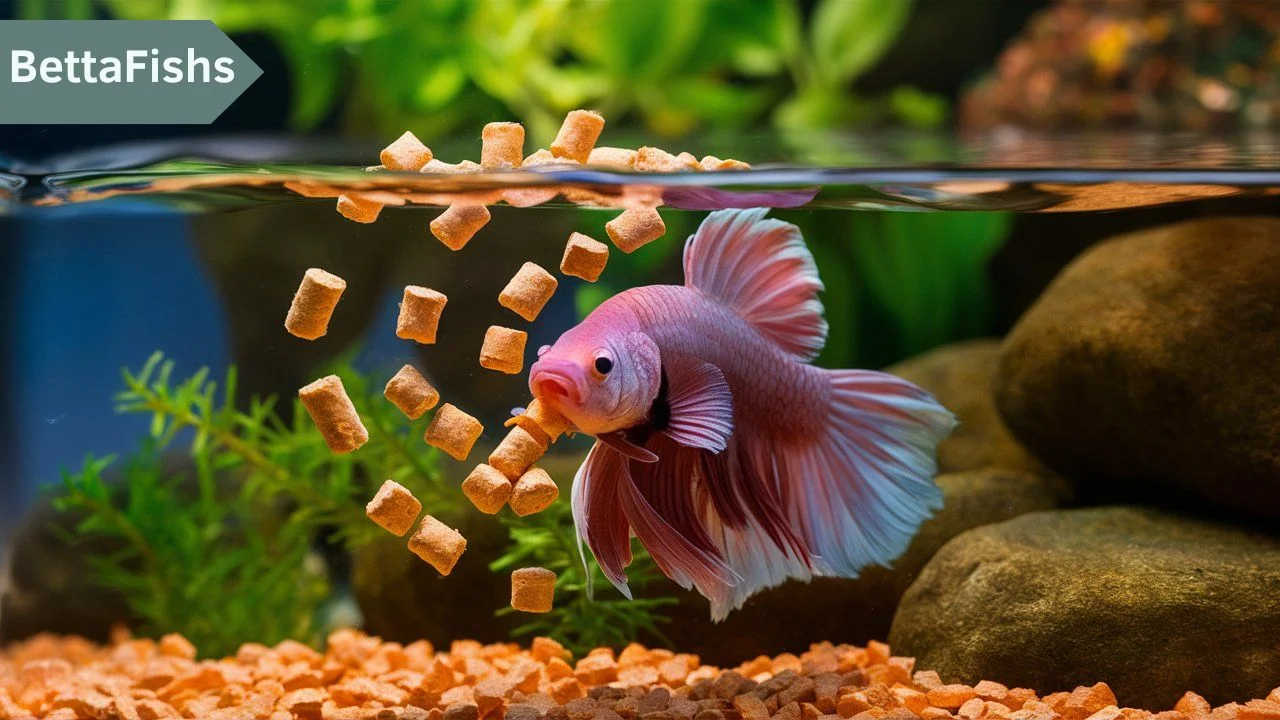
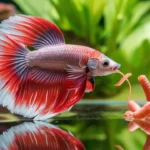
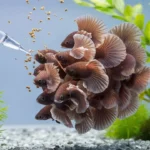
4 Comments
Leave a Reply4 Pings & Trackbacks
Pingback:How often are you supposed to feed a Betta fish?
Pingback:How much to feed a Betta fish?
Pingback:How Often Should You Feed Betta Fish?
Pingback:how to feed betta fish while on vacation?